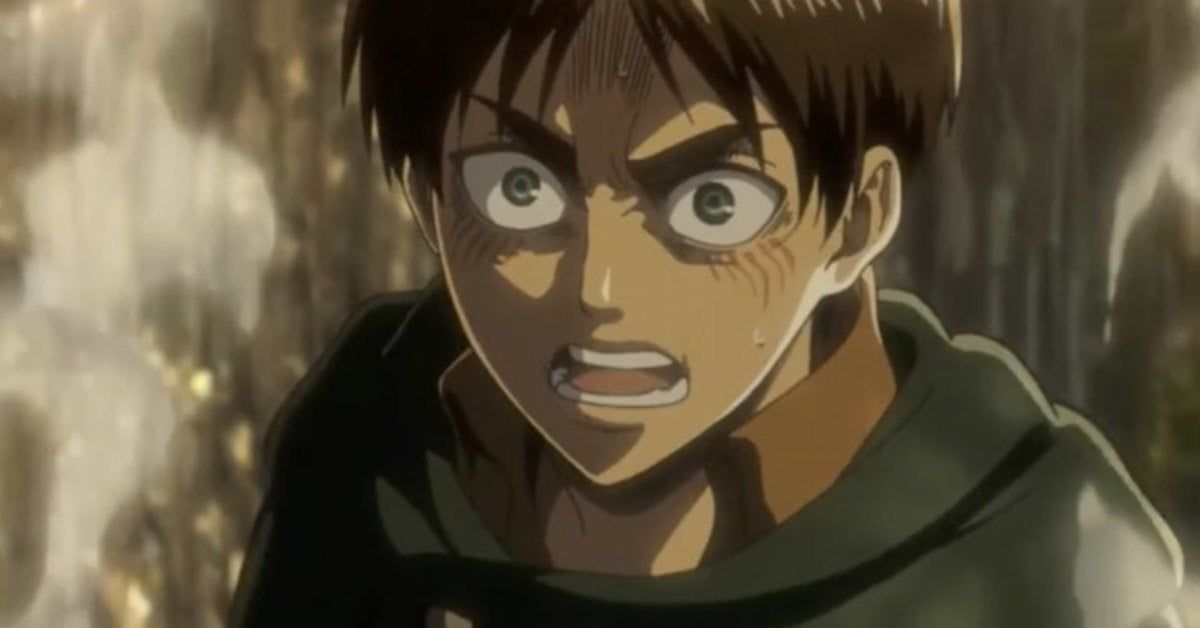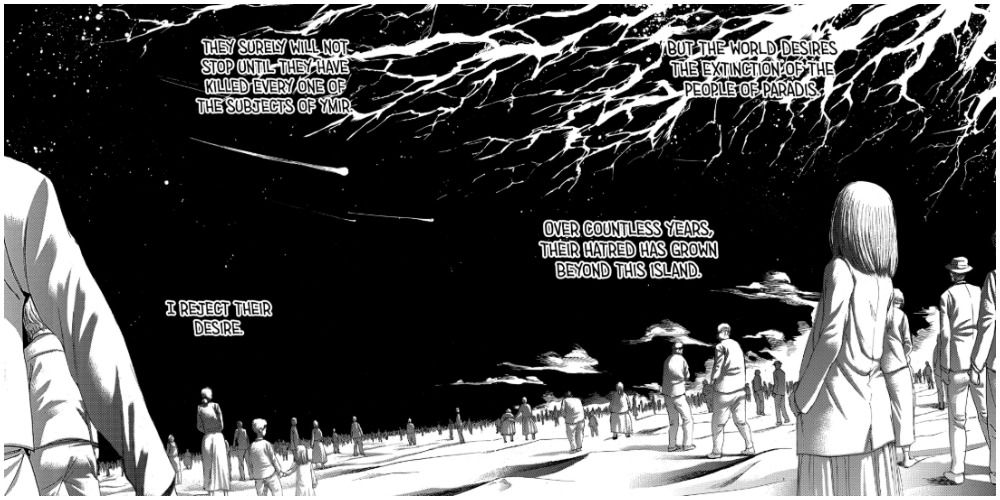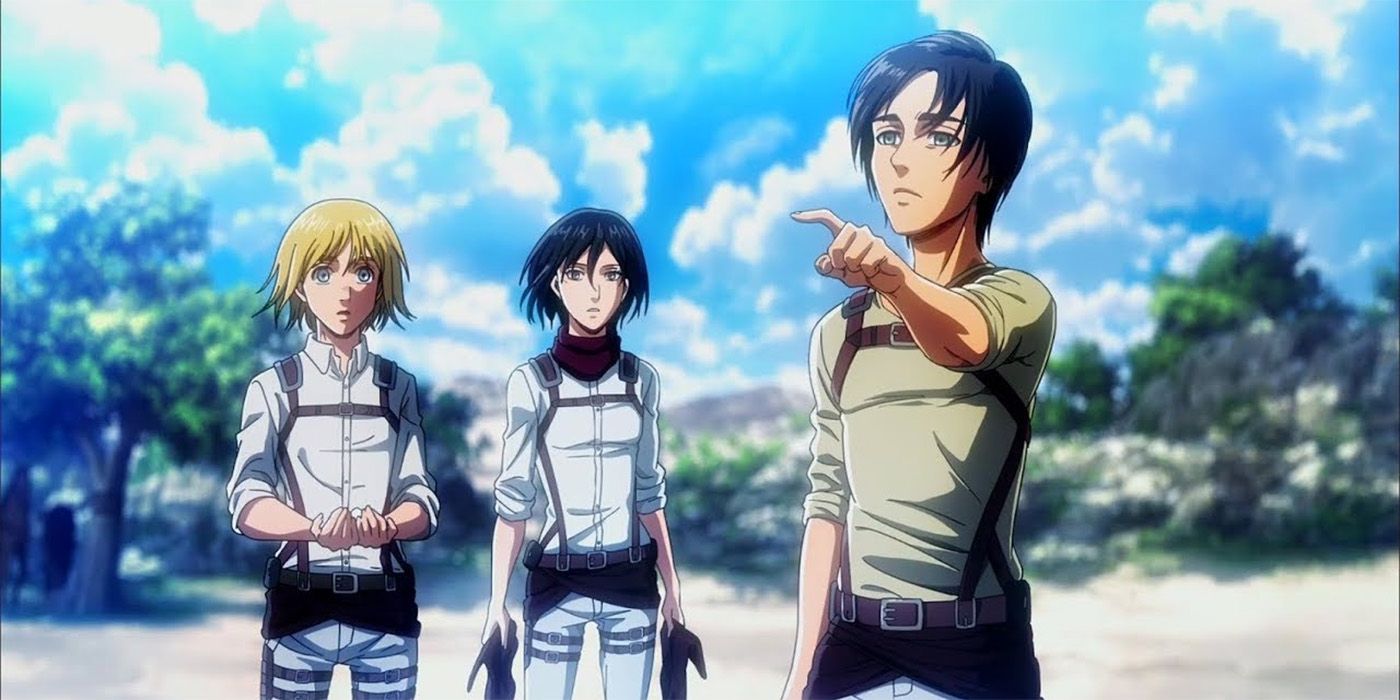WARNING: The following contains major spoilers for the Attack on Titan manga, available in English from Kodansha.
In the most recent and likely final arc of Attack on Titan, Eren, now possessing the full powers of the Founding Titan, has declared his intention to wipe out all humanity beyond his home of Paradis Island -- a move that surprised even the most hardcore of fans. Immediately after Eren's announcement, fans went on a frenzy, arguing about what would happen next.
Some theorize Eren is only bluffing and his true intention is still hidden, just like how he pretended to be a part of his half brother Zeke's "euthanasia" plan. Although Zeke's plans were not exactly to euthanize anyone but to instead prevent the procreation between future Eldians, many fans were, as you'd expect, against the idea and rejoiced when Eren turned against him. However, it wasn't long before Eren pulled the rug from underneath fans again, proclaiming his decision to commit genocide in order to free the Eldian race.
Immediately after that particular chapter, two camps formed within the Attack on Titan fandom: one that supported Eren's plans of killing all non-Paradisians in "self-defense," and another that condemned it as "immoral." This division in the fandom also mirrors that in the world of Attack on Titan, where one group is forming an alliance to stop Eren, while another has formed around Eren to perpetuate his vision, the latter group being dubbed the "Yeagerists" after the two Yeager brothers.
The argument in the fandom, in its simplest form, boils down to whether Eren will or will not go along with this plan and, if he does, whether or not Hajime Isayama's manga should end with the extermination of most of the human race. Some prefer the genocide ending because of how fitting it sounds for a manga as dark in tone as Attack on Titan, while others wish for a happier one. However, although it is true that Attack on Titan is a very grim story, the idea that it should have an ending as pitch black as that couldn't be further from the truth.
For readers who paid close attention, it should be clear that Attack on Titan is actually not a story about how dark and pointless living in a cruel world is, or about how badass killing your enemies is. Nor is it a shonen power fantasy. Attack on Titan is a close look at what it means to be free. It criticizes nationalism, prejudice and tyranny. How, then, could the protagonist of the manga, Eren, who symbolizes the driving force towards the notion of "freedom," be in favour of the annihilation of countless innocent lives for his personal nationalistic bias? The argument that Eren is doing this in self-defense falls apart when fans realize that Reiner and his friends sent by Marley were doing the exact same thing when they attacked Shiganshina. Eren activating the rumbling only proves Marley's paranoia correct.
In the prior arc to this one, Isayama explored the world of Marley, taking the point of view away from Paradis and fixing it instead on the warriors living in Liberio. There, he introduced readers to the character of Gabi, who much like young Eren, was fueled by an almost tribal desire to destroy the "enemy." She believed the Eldians living in Paradis to be devils but through her journey, she eventually developed into a character that was not just empathetic to Paradisians, but also realized that she was a victim of societal prejudice and propaganda.
The fact that her character arc exists proves that the author himself does not believe in the killing or division of people based on ethnicity or nationality, which is in direct contradiction to Eren's perceived plans of achieving freedom through the eradication of his "enemy."
"Who do you think the enemy is?" is something Erwin once asked Eren. Perhaps at the time, Erwin was implying the Titans weren't the real enemy but, instead, the humans secretly conspiring to restrict their freedom were. But even now that question still holds relevance. The innocent people ignorant in their prejudice for Eldians are no more the enemy than the mindless Titans that prey on humans -- they are only victims of the true enemy.
Perhaps that "true enemy" is the abstract concept of prejudice and hatred, or perhaps it is the people in power propagating a prejudiced narrative. Whichever it may be, it is unthinkable that, given Eren's development, that his true plan can be to achieve freedom by restricting the freedom of other people through genocide. As Kenny once said, "Everyone had to be drunk on something to keep pushing on ... Everyone was a slave to something." As the manga edges ever so closer to its final chapter, the biggest question left to answer is whether Eren is really a slave to his own pursuit of freedom, or for the pursuit of freedom for all of humanity.



